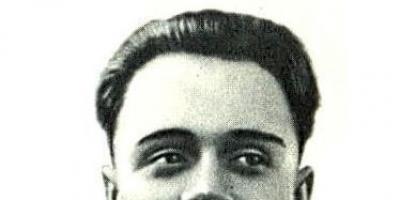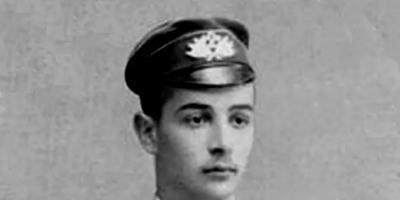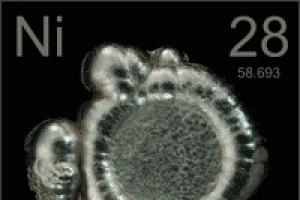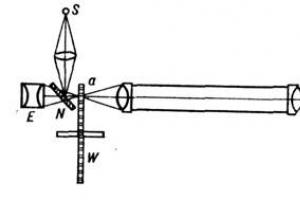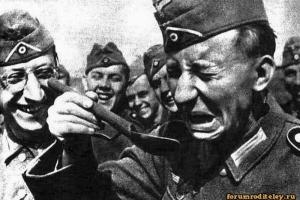To answer the question, tell me some example of the heroism of partisans during the Second World War given by the author Anya the best answer is Zina Portnova. Lenya Golikov. Zoya Kosmodemyanskaya. Fedorov and Kovpak...
Answer from Neurosis[guru]
Zoya and Alexander Kosmedemyansky no longer count? Or like in the 90s, why aren’t they heroes?
Answer from ChernoFF[guru]
Go to the Fraternal Cemetery, see who is buried there, how old they were then, and you will understand what and how it was then. Examples of heroism? The heroism was that people lived at that time. and not everyone survived, and this must be respected.
Answer from Special[expert]
If this is for school, then here is an example of a very young partisan, Hero of the Soviet Union ru.wikipedia.org/wiki/Golikov_L.
Answer from Wake up[guru]
Leonid Aleksandrovich Golikov, known as Lenya Golikov, (1926, village of Lukino, Novgorod region - January 24, 1943, Ostaya Luka, Pskov region) - teenage partisan. Brigade reconnaissance officer of the 67th detachment of the fourth Leningrad partisan brigade, operating in the Novgorod and Pskov regions. Participated in 27 combat operations. He especially distinguished himself during the defeat of German garrisons in the villages of Aprosovo, Sosnitsy, and Sever.
In total, he destroyed: 78 Germans, two railway and 12 highway bridges, two food and fodder warehouses and 10 vehicles with ammunition. Accompanied a convoy with food (250 carts) to besieged Leningrad. For valor and courage he was awarded the Order of Lenin, the Order of the Red Banner of Battle and the medal “For Courage”.
On August 13, 1942, returning from reconnaissance from the Luga-Pskov highway near the village of Varnitsa, he blew up a car with a grenade in which there was a German major general of the engineering troops, Richard von Wirtz. In a shootout, Golikov shot the general, the officer accompanying him, and the driver with a machine gun. The intelligence officer delivered a briefcase with documents to the brigade headquarters. These included drawings and descriptions of new models of German mines, inspection reports to higher command and other important military papers. Nominated for the title of Hero of the Soviet Union.
On January 24, 1943, in an unequal battle in the village of Ostraya Luka, Pskov Region, Leonid Golikov died.
By decree of the Presidium of the Supreme Council of April 2, 1944, Leonid Aleksandrovich Golikov was posthumously awarded the title of Hero of the Soviet Union.
Subsequently, he was included in the list of pioneer heroes, although by the beginning of the war he was already 15 years old.
For a long time it was believed that no photographs of Lenya Golikov had survived, and Lenya’s sister Lida posed for the portrait created by Viktor Fomin in 1958. But there is also an authentic photograph of the Hero. In honor of Lenya Golikov in the Kirovsky district of St. Petersburg, a street was named (between Stachek Avenue and People's Militia Avenue).
Answer from Adelka[guru]
Career officer, captain of the Red Army German Alexander Viktorovich. Born in 1915 in Leningrad. Russian. Member of the CPSU since 1942
For the first time in partisan practice, Herman created a stationary airfield near the base, cut a clearing in the forest, equipped a runway and infrastructure for receiving heavy transport aircraft, and set up warning posts and anti-aircraft crews. The problem of supply and communication with the “mainland” was solved. Several attempts to raise fighter aircraft to intercept partisan aircraft ended in attacks (capturing the airfield, of course, was an unrealistic task) on the oil base in the city of Porkhov and aircraft warehouses in the village of Pushkinskie Gory, as a result of which all consumable supplies of fuel, ammunition and other things were destroyed. The regiment turned out to be incapable of combat and was unable to carry out combat missions at the front. They could get scolded for being partisans, but for such consequences you can actually get punished. The commander of the Luftwaffe regiment clearly understood this. And planes flew into the “forest” regularly.
Re-reading Zoshchenko, I came across in the now little-known "Stories about Partisans" a story about the "Elusive detachment of Comrade Herman", which was very strong in the dense Pskov forests, and almost opened village councils and executive committees in the villages and hamlets opposite the German commandant's offices, and so on firmly defended the Soviet government, that punitive forces and other evil spirits preferred to move along “their side”, without trying to cross the road.
Very funny.
We all know Zoshchenko as an outstanding master of the grotesque, hyperbole and sarcasm. But I don’t consider him an inventor and a visionary at all, especially since the topic in those years (and the story of 1947) was more than serious.
Out of the blue, I decided to do a little research. In the memoirs of famous figures of the partisan movement, I did not find anything intelligible on this score, which only provoked me.
And this is what we managed to establish.
I warn you in advance that although the stories look completely fantastic, everything stated is based on historical facts. I am not going to convince anyone and give a voluminous list of primary sources; any Doubting Thomas can easily take his own journey into history.
Let's start with the fact that there was no mysterious “Comrade Herman”. And there was a very real career officer, captain of the Red Army German Alexander Viktorovich. Born in 1915 in Leningrad. Russian. Member of the CPSU since 1942. Before the war, he lived and studied in Moscow for several years. A graduate of the Oryol Tank School, graduated from the Military Academy named after. M.V. Frunze. From July 1941 - on the North-Western Front, an intelligence department officer, responsible for communications and coordination of partisan detachments. In September 1941, he was sent to the German rear, the main task was reconnaissance, destruction of Germans and sabotage of communications. The initial strength of the detachment was about 100-150 fighters.
The detachment not only fought successfully, but also settled down in a completely unconventional way for partisans - in the depths of the forests, far from well-trodden roads, a stationary base arose, which over time turned into a real fortified area - with permanent buildings, barracks, kitchens, baths, an infirmary, headquarters, warehouses, etc. .P.
By the summer of 1942, the successes of the detachment, the commanding talent and economic abilities of Herman led to the formation of a professional partisan brigade on its base, its number increased to 2,500 people, the combat zone spread to most of the territory of Porkhovsky, Pozherevitsky, Slavkovichsky, Novorzhevsky, Ostrovsky and other districts of the Pskov region.
But let's stop. About the activities of A.V. Herman, you can talk about his military innovations and non-standard solutions for as long as you like, give hundreds of examples, and everything will be small and will not give a complete impression of this talented person.
And now - a few facts.
For the first time in partisan practice, Herman created a stationary airfield near the base, cut a clearing in the forest, equipped a runway and infrastructure for receiving heavy transport aircraft, and set up warning posts and anti-aircraft crews. The problem of supply and communication with the “mainland” was solved. Several attempts to raise fighter aircraft to intercept partisan aircraft ended in attacks (capturing the airfield, of course, was an unrealistic task) on the oil base in the city of Porkhov and aircraft warehouses in the village of Pushkinskie Gory, as a result of which all consumable supplies of fuel, ammunition and other things were destroyed. The regiment turned out to be incapable of combat and was unable to carry out combat missions at the front. They could get scolded for being partisans, but for such consequences you can actually get punished. The commander of the Luftwaffe regiment clearly understood this. And planes flew into the “forest” regularly.
However, this seemed to Herman not enough. During one of the forays, a “peat” narrow-gauge railway was discovered running near the base with rolling stock abandoned on it in a hurry during the retreat - steam locomotives, wagons and platforms. The road led to the front line, and through the most remote swamps and swamps (in fact, peat is mined there). There was one problem - a section of the narrow-gauge railway passed along the outskirts of the Podseva junction station, which served as a transit point for the German army and had a strong garrison. When transportation was necessary, crushing blows were dealt to the station each time, and “on the quiet” the partisan trains successfully passed through the bad place. In the end (I want to live), the garrison command simply stopped paying attention to the small locomotives and carriages scurrying back and forth across the outskirts of the station, especially since they did not create any special problems, behaved decently and preferred to travel at night. All this time, partisan transportation was carried out from the front line (!) to the enemy rear (!) by rail (!). This has never happened before or since.
After the planned replacement of the previous garrison, a new commandant, Major Paulwitz, arrived at the station from the headquarters. Despite the “subtle” hints from his replacement, the situation with enemy trains constantly passing through his station amazed him so much that that same evening the path was cut and another transport was ambushed. The next morning the station was captured in a swift attack and held for several days, the garrison was destroyed, the cargo was blown up or taken as trophies. Along the way, five bridges were “completely” blown up, including the strategic one across the Keb River. The road stopped for exactly 12 days. It is not known exactly who shot Paulwitz, at least in the brigade’s reports this feat is not credited to any of the partisans.
According to the recollections of the railway workers, the Germans soon pulled the barbed wire from the tracks to the narrow gauge and no longer noticed it at point-blank range.
Lovers of “befel und ordnung” began to worry about such disgrace. A special group arrived from the Abwernebenstelle of Smolensk under the command of an authoritative specialist in the fight against partisans (the name has not been preserved, and it doesn’t matter). This “craftsman” was responsible for about a dozen destroyed partisan detachments in the Smolensk region. Using his intelligence channels, Herman revealed the secret of his success: when capturing or destroying partisans, they took off their clothes and shoes, gave them a sniff to ordinary police bloodhounds - after which a squad of punitive forces followed the tracks exactly to the partisan base, bypassing all the swamps, ambushes and mines. The use of well-known methods - sprinkling traces with shag, pouring urine on them did not help, because this fact only confirmed the correctness of the route. The groups began to leave one way and return another. Immediately after passing “there” the path was carefully mined. Just like after the “back” passage. The “craftsman” himself (after the death of several punitive detachments, he quickly realized what was going on and did not “fall for” this trick) was dealt with even more elegantly: by mining in front of the captive “tongue” according to the standard “return path” scheme, Then they led him along a secret sunken road. It is not known exactly how, but he still escaped and returned to his people along this road. Alive. That means the dirt is clean. The Abwehr man, rubbing his hands contentedly, asked for a large detachment, and, smiling impudently, led him around the mines this way. He himself did not return and “demobilized” two SS companies. The gate nevertheless exploded, without much noise. From both ends at the same time. There was no need to shoot; the swamp handled it 100%. The command was alarmed - how could an ENTIRE SS detachment disappear without a trace, and even without any signs of battle? But they didn’t try to find the base again until the fall of 1943.
Herman’s brigade had more than friendly relations with the local population. Thanks to the airport and railway station (!) operating on the base, a reasonable supply was established, so the villagers did not see the partisan food detachments, and the Germans preferred, for well-known reasons, not to get hold of grub in the villages near the detachment and not to disturb the population with their presence again.
Gradually, Herman began to change tactics in the territory under his control - from purely military to military-political. A military tribunal was organized, which held open field sessions in villages and hamlets (the institution of policemen and other elders and accomplices instantly disappeared as a biological species, and the Germans caught were transferred to the status of prisoners of war, and sent by rail to camps on the mainland... yes -yes... past that same Podseva station).
An infirmary was opened where surrounding residents could go and receive all possible medical care. In severe cases, doctors made house calls (!). Soviet "ambulance" in the German rear. Yeah...
In order to resolve current issues, temporary village councils and executive committees were formed, which traveled to places, carried out propaganda work and received the population. Of course, they did not occupy the building opposite the German commandant’s office, as Zoshchenko ironically, they came for a short time and to a pre-selected place, but, nevertheless...
Then the irreparable happened. No, no, no executive committee was captured, and there were no sick German spies.
At the next reception of the underground executive committee, a deputation of the station garrison showed up, sort of wiser heirs of Paulwitz, with the humblest request - they should be replaced, I really want to go back to Vaterland, to their families. And since the roads and bridges in the area have all been blown up, and the roads are mined and in general they cannot be passed on anyway, then... is it possible for them to get a pass? Or get out using the partisan railway (after all, only one is operational), but in the opposite direction. And they, in general, are nothing. With all understanding. The trains pass through regularly and they even monitor the tracks so that no one causes damage.
A few days later, an officer from the local field commandant’s office showed up with a complaint about a detachment of foragers from some neighboring unit who were roaming the villages and procuring food and oats for themselves, which the villagers were not at all happy about. And since he personally and his warriors are not going to answer with their own skin for this outrage, then isn’t it possible... this detachment... well... in general, be kicked out?
It is not known how these surreal claims ended for the petitioners (the consequences are not mentioned in the primary sources, although these facts themselves are noted), but somehow they became known to the high command, including in Berlin.
To say that the command was furious is to say nothing. A whole bunch of local commanders and officers were arrested, convicted, demoted or sent to the front. Despite the tense situation, an ENTIRE combat-ready division, along with tanks, artillery and aircraft, and two SS units with a total strength of about 4,500 people were removed from the front.
The brigade was surrounded, stubborn fighting ensued, Herman personally commanded the withdrawal and planned another brilliant combination, and, although with losses, the brigade successfully broke through to the regular troops, destroying more than half of the attacking troops. During the battle, the commander of the 3rd partisan brigade, Colonel Alexander Viktorovich German, was wounded three times, the last wound to the head was fatal. He died on September 6, 1943 near the village of Zhitnitsy. Posthumously awarded the title of Hero of the Soviet Union.
Reading the dry official report (... the brigade under the command of Herman from June 1942 to September 1943 killed 9,652 Nazis, wrecked 44 railway trains with enemy personnel and equipment, blew up 31 railway bridges, destroyed 17 enemy garrisons, up to 70 volost administrations etc...), I don’t understand why we know almost nothing about this man, how could the name of one of the most talented and successful military leaders, who had non-trivial strategic thinking, melt away in the fog of hoary antiquity?
The detailed description of the combat operations of the Alexander German brigade is completely baffling - could a person act like that, achieve such amazing results in defeating the enemy in the most difficult conditions, operating behind enemy lines, when the regular army was rapidly retreating, when the outcome of the war was still completely unknown...
Read this document, give it credit.
Today in Pskov: May 04, 2019 21:13:19
Statistics:
- current request:
- results found: 4
- results pages: 1
← Alas! But that's all it was! →
Hero of the Soviet Union, major. Born in Petrograd into the family of an employee. After graduating from seven-year school, he worked as a mechanic and studied at an automotive technical school. Since November 1933 in the Red Army. In 1937 he graduated from the Oryol Armored School. Served in a mechanized brigade. The Great Patriotic War (1941 - 1945) found him a second-year student at the M. V. Frunze Military Academy. From July 1941 - in the intelligence department of the headquarters of the North-Western Front, then - deputy commander of the 2nd special partisan reconnaissance brigade. In the summer of 1942 he became commander of the 3rd Leningrad Partisan Brigade. Under his command, the brigade destroyed several thousand enemy soldiers and officers, derailed over 300 railway trains, blew up hundreds of cars, and saved 35 thousand Soviet citizens from being stolen into slavery. He died on September 6, 1943, leaving enemy encirclement, near the village of Zhitnitsy, Novorzhevsky district. On April 2, 1944, he was posthumously awarded the title of Hero. Awarded the Order of the Red Banner, Order of the Patriotic War, 1st degree. He was buried in the square of the city of Valdai, Novgorod region. An obelisk was built in the village of Zhitnitsy. Streets in Leningrad, Novgorod, Novorzhev, Ostrov, Porkhov, Pskov are named after the Hero.
Source: Pskov Encyclopedia. Editor-in-chief - A. I. Lobachev. Pskov, Pskov regional public institution - publishing house "Pskov Encyclopedia", 2007 | →
 Hero of the Owls. Union. Place of birth - St. Petersburg. After graduating from a seven-year school, he worked as a mechanic and studied at an automotive technical school. In November 1933 he was drafted into the army. In 1937 he graduated from the Oryol Armored School. Served in a mechanized brigade. In the pre-war years, he was a 2nd year student at the Military Academy named after. M. V. Frunze. From July 1941 - in the intelligence department of the headquarters of the North-West. front, then deputy. commands 2nd Special Partisan. reconnaissance brigades. Since the summer of 1942 - teams. 3rd LPB. Under his command, the brigade destroyed several thousand enemy soldiers and officers, derailed many railway trains, and saved 35 thousand owls from being stolen into slavery. citizens. G. died while leaving the enemy encirclement near the village of Zhitnitsa, Novorzhevsky district of Psk. region. Title of Hero of the Soviet Union. Union - 04/2/1944. An obelisk was built in the village of Zhitnitsa.
Hero of the Owls. Union. Place of birth - St. Petersburg. After graduating from a seven-year school, he worked as a mechanic and studied at an automotive technical school. In November 1933 he was drafted into the army. In 1937 he graduated from the Oryol Armored School. Served in a mechanized brigade. In the pre-war years, he was a 2nd year student at the Military Academy named after. M. V. Frunze. From July 1941 - in the intelligence department of the headquarters of the North-West. front, then deputy. commands 2nd Special Partisan. reconnaissance brigades. Since the summer of 1942 - teams. 3rd LPB. Under his command, the brigade destroyed several thousand enemy soldiers and officers, derailed many railway trains, and saved 35 thousand owls from being stolen into slavery. citizens. G. died while leaving the enemy encirclement near the village of Zhitnitsa, Novorzhevsky district of Psk. region. Title of Hero of the Soviet Union. Union - 04/2/1944. An obelisk was built in the village of Zhitnitsa.
Source: Pskov Biographical Dictionary. Under general ed. V. N. Leshchikova. Pskov, Perm State Pedagogical Institute, 2002 | →
 Commander of the 3rd Leningrad Partisan Brigade. Killed in battle on the night of September 5-6, 1943. Hero of the Soviet Union.
Commander of the 3rd Leningrad Partisan Brigade. Killed in battle on the night of September 5-6, 1943. Hero of the Soviet Union.
Source: Unconquered land of Pskov. Documents and materials on the history of the partisan movement and the party-Komsomol underground during the Great Patriotic War of 1941 - 1944. Almukhamedov Ya. N., Arsenyeva A. P., Rafelson G. R., Fuzinsan E. K.. Velikiye Luki, Lenizdat, 1969 | →
 Born in Petrograd. He graduated from seven-year school and worked as a mechanic. In November 1933 he joined the Red Army. In 1937 he graduated from the Oryol Armored School.
Born in Petrograd. He graduated from seven-year school and worked as a mechanic. In November 1933 he joined the Red Army. In 1937 he graduated from the Oryol Armored School.
From July 1941, German served in the intelligence department of the headquarters of the North-Western Front, and then as deputy commander of the 2nd Special Partisan Brigade for reconnaissance. Since the summer of 1942, Major Alexander German was the commander of the 3rd Leningrad Partisan Brigade, which operated in the Leningrad, Pskov, Novgorod and Tver (then Kalinin) regions. By the end of 1942, the brigade already numbered more than 1,000 partisans, and in the fall of 1943 - 2,500 people. Germanov's partisan detachments liberated hundreds of settlements in the Novgorod, Pskov and Tver regions. Places around the cities of Staraya Russa, Dno and Bezhanitsy began to be called the Partisan Region.
From June 1942 to September 1943, the brigade destroyed 9,652 Nazis, crashed 44 railway trains with enemy personnel and equipment, blew up 31 railway bridges, destroyed 17 enemy garrisons, and up to 70 volost administrations.
Major German died a heroic death on September 6, 1943, leaving enemy encirclement near the village of Zhitnitsy, Novorzhevsky district. He was buried in the square of the city of Valdai, Novgorod region. By order of the chief of the Leningrad headquarters of the partisan movement dated September 7, 1943, the 3rd Leningrad Partisan Brigade was named after its deceased commander.
By decree of the Presidium of the Supreme Soviet of the USSR dated April 2, 1944, Major German Alexander Viktorovich was posthumously awarded the title of Hero of the Soviet Union. A street in the Zavokzalny district of Pskov is named after him. In addition, streets are named after the Hero and memorial plaques are installed in cities of the Pskov region: a street in Novorzhev, a street and alley in Ostrov, a street and alley in Porkhov.
A well-kept monument, photos, texts... for example, excellent material: http://blokada.otrok.ru/biogr.php?l=4&n=1eav&t=2 with reference to two book editions:
There are probably descendants of the hero... We have not forgotten anything. But the author of the publication believes that this is not so.

Herman is a forgotten Partisan with a capital P.
Many St. Petersburg residents know the street "Partizan German", but few know in honor of which outstanding person this street is named.

Zoshchenko’s stories contain information about a certain “detachment of Comrade Herman,” which was very strong in the dense forests of the Leningrad, Kalinin and Pskov regions, and almost opened village councils and executive committees in villages and hamlets opposite the German commandant’s offices, and so firmly defended Soviet power, that the fascists and other evil spirits preferred to stay away, not trying to cross the road, and if they crossed the road, they got very hurt.
Very funny.
We all know Zoshchenko as an outstanding master of the grotesque, hyperbole and sarcasm. But I didn’t and don’t consider him an inventor and a dreamer at all, especially since the topic in those years (and the story of 1947) was more than serious.
Having taken a “journey into the past”, according to the memoirs of the leaders of partisan movements and not finding anything, I already thought that this was a figment of fantasy, but I found some clues and contacted German Alexander Viktorovich, and then it was much easier.
I warn you in advance that although the stories look completely unrealistic and made up, everything stated is based on historical facts. I am not going to convince anyone; any Doubting Thomas can easily take his own journey into history.
Let's start with the fact that the captain of the Red Army is German Alexander Viktorovich. Born in 1915 in Leningrad. Russian. Member of the CPSU since 1942. Before the war, he lived and studied in Moscow for several years. A graduate of the Oryol Tank School, graduated from the Military Academy named after. M.V. Frunze. From July 1941 - on the North-Western Front, an intelligence department officer, responsible for communications and coordination of partisan detachments. In September 1941, he was sent to the German rear, the main task was reconnaissance, destruction of Germans and sabotage of communications. The initial strength of the detachment was about 100-150 fighters.
A.V. German, according to the testimony of his comrades in arms, combined many of the qualities of a Soviet commander: courage, courage, high military skill, optimism and tireless activity. He was one of the first to use raiding tactics of guerrilla forces, a bold and skillful maneuver in combat operations. The partisans loved Herman dearly for his personal courage, ability to command, integrity, closeness to people, and sincerity. He was 28 years old.

The detachment not only fought successfully, but also settled down in a completely unconventional way for partisans - in the depths of the forests, far from well-trodden roads, a stationary base arose, which over time turned into a real fortified area - with permanent buildings, barracks, kitchens, baths, an infirmary, headquarters, warehouses, etc. .P.
By the summer of 1942, the successes of the detachment, the commanding talent and economic abilities of Herman led to the formation of a professional partisan brigade on its base, its number increased to 2,500 people, the combat zone spread to most of the territory of Porkhovsky, Pozherevitsky, Slavkovichsky, Novorzhevsky, Ostrovsky and other districts of the Pskov region.
And now the incredible facts:
For the first time in partisan practice, Herman created a stationary airfield near the base, cut a clearing in the forest, equipped a runway and infrastructure for receiving heavy transport aircraft, and set up warning posts and anti-aircraft crews. The problem of supply and communication with the “mainland” was solved. Several attempts to raise fighter aircraft to intercept partisan aircraft ended in attacks on an oil base in the city of Porkhov and aircraft warehouses in the village of Pushkinskie Gory, as a result of which all consumable supplies of fuel, ammunition and other things were destroyed. The regiment turned out to be incapable of combat and was unable to carry out combat missions at the front. They could get scolded for being partisans, but for such consequences you can actually get punished. The commander of the Luftwaffe regiment clearly understood this. And planes flew into the “forest” regularly.
However, this seemed to Herman not enough. During one of the forays, a “peat” narrow-gauge railway was discovered running near the base with rolling stock abandoned on it in a hurry during the retreat - steam locomotives, wagons and platforms. The road led to the front line, and through the most remote swamps and swamps (in fact, peat is mined there). There was one problem - a section of the narrow-gauge railway passed along the outskirts of the Podseva junction station, which served as a transit point for the German army and had a strong garrison. When transportation was necessary, crushing blows were dealt to the station each time, and “on the quiet” the partisan trains successfully passed through the bad place. In the end (I want to live), the garrison command simply stopped paying attention to the small locomotives and carriages scurrying back and forth across the outskirts of the station, especially since they did not create any special problems, behaved decently and preferred to travel at night. All this time, partisan transport was carried outfrom the front line to the enemy's rear by rail
. This has never happened before or since.
After the planned replacement of the previous garrison, a new commandant, Major Paulwitz, arrived at the station from the headquarters. Despite the “subtle” hints from his replacement, the situation with enemy trains constantly passing through his station amazed him so much that that same evening the path was cut and another transport was ambushed. The next morning the station was captured in a swift attack and held for several days, the garrison was destroyed, the cargo was blown up or taken as trophies. Along the way, five bridges were “completely” blown up, including the strategic one across the Keb River. The road stopped for exactly 12 days. It is not known exactly who shot Paulwitz, at least in the brigade’s reports this feat is not credited to any of the partisans.
According to the recollections of the railway workers, the Germans soon pulled the barbed wire from the tracks to the narrow gauge and no longer noticed it at point-blank range.
A special group arrived from Smolensk under the command of an authoritative specialist in the fight against partisans (the name has not been preserved, and it doesn’t matter). This “specialist” was responsible for the destruction of about a dozen partisan detachments in the Smolensk region. Using his intelligence channels, Herman revealed the secret of his success: when capturing or destroying partisans, they took off their clothes and shoes, gave them a sniff to ordinary police bloodhounds - after which a squad of punitive forces followed the tracks exactly to the partisan base, bypassing all the swamps, ambushes and mines. The use of well-known methods - sprinkling traces with shag, pouring urine on them did not help, because this fact only confirmed the correctness of the route. The groups began to leave one way and return another. Immediately after passing “there” the path was carefully mined. Just like after the “back” passage. The “craftsman” himself (after the death of several punitive detachments, he quickly realized what was going on and did not “fall for” this trick) was dealt with even more elegantly: by mining in front of the captive “tongue” according to the standard “return path” scheme, Then they led him along a secret sunken road. It is not known exactly how, but he still escaped and returned to his people along this road. Alive. That means the dirt is clean. The Abwehr man, rubbing his hands contentedly, asked for a large detachment, and, smiling impudently, led him around the mines this way. He himself did not return and “demobilized” two SS companies. The gate nevertheless exploded, without much noise. From both ends at the same time. There was no need to shoot; the swamp handled it 100%. The command was alarmed - how could he disappear without a trace? ENTIRESS detachment, and even without any signs of battle? But they didn’t try to find the base again until the fall of 1943.
Herman’s brigade had more than friendly relations with the local population. Thanks to the airport and railway station operating on the base a tolerable supply was established, so the villagers did not see the partisan food detachments, and the Germans preferred, for well-known reasons, not to get hold of grub in the villages near the detachment and not to disturb the population with their presence again.
Gradually, Herman began to change tactics in the territory under his control - from purely military to military-political. A military tribunal was organized, which held open field sessions in villages and hamlets (the institution of policemen and other elders and accomplices instantly disappeared as a biological species, and the Germans caught were transferred to the status of prisoners of war, and sent by rail to camps on the mainland... yes -yes... past that same Podseva station).
An infirmary was opened where surrounding residents could go and receive all possible medical care. In severe cases, doctors went ON HOUSE. Soviet "ambulance" in the German rear. Hmmm...
In order to resolve current issues, temporary village councils and executive committees were formed, which traveled to places, carried out propaganda work and received the population. Of course, they did not occupy the building opposite the German commandant’s office, as Zoshchenko ironically, they came for a short time and to a pre-selected place, but, nevertheless...
Then the irreparable happened. No, no, no executive committee was captured, and there were no sick German spies.
At the next reception of the underground executive committee, a deputation of the station garrison showed up, sort of wiser heirs of Paulwitz, with the humblest request - they should be replaced, I really want to go back to Vaterland, to their families. And since the roads and bridges in the area have all been blown up, and the roads are mined and in general they cannot be passed on anyway, then... is it possible for them to get a pass? Or get out using the partisan railway (after all, only one is operational), but in the opposite direction. And they, in general, are nothing. With all understanding. The trains pass through regularly and they even monitor the tracks so that no one causes damage.
A few days later, an officer from the local field commandant’s office showed up with a complaint about a detachment of foragers from some neighboring unit who were roaming the villages and procuring food and oats for themselves, which the villagers were not at all happy about. And since he personally and his warriors are not going to answer with their own skin for this outrage, then isn’t it possible... this detachment... well... in general, be kicked out?
It is not known how these surreal claims ended for the petitioners (the consequences are not mentioned in the primary sources, although these facts themselves are noted), but somehow they became known to the high command, including in Berlin.
To say that the command was furious is to say nothing. A whole bunch of local commanders and officers were arrested, convicted, demoted or sent to the front. Despite the tense situation, there was WHOLEa combat-ready division was removed along with tanks, artillery and aircraft, and two SS units with a total strength of about 4,500 people.
The brigade was surrounded, stubborn fighting ensued, Herman personally commanded the withdrawal and planned another brilliant combination, and, although with losses, the brigade successfully broke through to the regular troops, destroying more than half of the attacking troops.
In the village of Zhitnitsa, the advance detachment came across a punitive garrison and defeated it. The brigade escaped from encirclement to the Rugodevsky forests area; during the battle, the commander of the 3rd partisan brigade, Colonel Alexander Viktorovich German, was wounded three times, the last wound to the head was fatal. He died on September 6, 1943 near the village of Zhitnitsy. Soon an order was received from the Leningrad headquarters of the partisan movement to name the brigade after Herman and henceforth to call it: 3rd Partisan Brigade named after Herman of the Leningrad headquarters of the partisan movement. In April 1943, Alexander Viktorovich German was posthumously awarded the title of Hero of the Soviet Union.
After this, the brigade continued successful operations behind enemy lines, about which you can Reading the official report (the brigade under the command of Herman, from June 1942 to September 1943, killed 9,652 Nazis, crashed 44 railway trains with enemy personnel and equipment, blew up 31 railway bridges, destroyed 17 enemy garrisons, up to 70 volost administrations, and so on. ..), I don’t understand why we know almost nothing about this man, how could the name of one of the most talented and successful military leaders, who had non-trivial strategic thinking, melt away in the fog of hoary antiquity?
The detailed description of the combat operations of the Alexander German brigade is completely baffling - could a person act like this, achieve such amazing results in defeating the enemy in the most difficult conditions, operating behind enemy lines, when the regular army was rapidly retreating, when the outcome of the war was still completely unknown.. .
What do we know about the last heroes of the Brest Fortress, whom the Nazis saluted? What do we know about fighting behind enemy lines? What do we even know about the Great Patriotic War if we are engaged in debunking existing exploits, but do not want to remember other exploits at all? After all, the entire Victory in the Great War should rightfully be considered a people's victory! After all, how many “Matrosovs” and “Gastellos” there were, the names were simply assigned to them, and there were, if not thousands, then dozens of such people. And we need to make films about these people Of people, and not about the “good Germans” throwing chocolates.
Thank you for your attention, study history!
http://lirik-kirill.livejournal.com/2958.html

